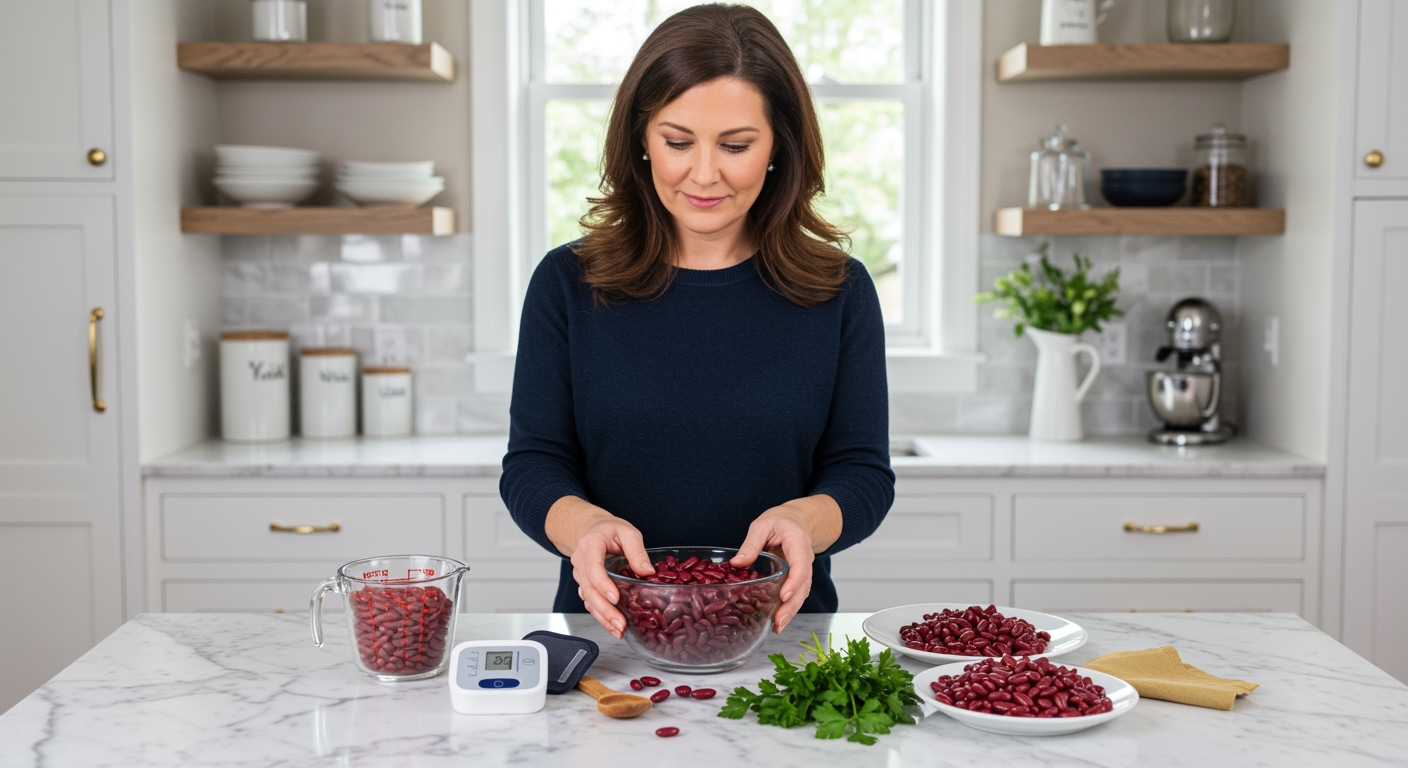✪ Key Takeaway: Kidney beans can help raise low blood pressure through potassium, magnesium, and protein content that supports healthy circulation.
Introduction
Your doctor just told you that your blood pressure is too low and you need to make some dietary changes.
You might be wondering if common foods like kidney beans can actually help raise your blood pressure to healthier levels.
Hi, I am Abdur, your nutrition coach and today I am going to explain exactly how kidney beans affect low blood pressure and whether you should include more of them in your diet.
What Makes Kidney Beans Special For Blood Pressure?
Kidney beans contain a powerful combination of nutrients that directly impact your cardiovascular system.
One cup of cooked kidney beans provides about 713 milligrams of potassium, which is roughly 15% of your daily needs.
This mineral helps your blood vessels relax and maintains proper fluid balance in your body.
The magnesium content in kidney beans works alongside potassium to support healthy blood vessel function.
Each serving delivers about 74 milligrams of magnesium, which helps your heart muscle contract properly and maintains steady blood flow.
The protein content of 15 grams per cup also plays a crucial role in maintaining blood volume and supporting overall circulation.
Unlike processed foods that can cause blood pressure spikes and crashes, kidney beans provide steady nutritional support throughout the day.
✪ Fact: Kidney beans contain more potassium per serving than many fruits commonly recommended for blood pressure support.
How Do Kidney Beans Actually Raise Low Blood Pressure?
When you have low blood pressure, your body struggles to pump blood effectively to all your organs.
The complex carbohydrates in kidney beans provide sustained energy that helps your heart maintain consistent pumping strength.
These carbs break down slowly, preventing the energy crashes that can worsen low blood pressure symptoms.
The fiber content of 11 grams per cup helps stabilize blood sugar levels, which directly affects blood pressure regulation.
When your blood sugar stays steady, your cardiovascular system does not have to work as hard to compensate for sudden changes.
Kidney beans also contain folate and iron, two nutrients that support healthy red blood cell production.
More healthy red blood cells mean better oxygen delivery throughout your body, which can help raise blood pressure to normal levels naturally.
✪ Pro Tip: Soak kidney beans overnight and cook them with a pinch of sea salt to maximize their blood pressure benefits.
What Is The Best Way To Eat Kidney Beans For Low Blood Pressure?
The timing and preparation of kidney beans can significantly impact their effectiveness for blood pressure support.
Eating half a cup of cooked kidney beans twice daily provides optimal nutrient distribution without overwhelming your digestive system.
You can add them to your breakfast as part of a hearty bean and vegetable scramble.
For lunch or dinner, kidney beans work perfectly in soups, stews, and salads where they can be combined with other blood pressure supporting foods.
Always cook dried kidney beans thoroughly, as undercooked beans contain compounds that can cause digestive issues.
If you choose canned kidney beans, rinse them well to remove excess sodium that could counteract their blood pressure benefits.
Combining kidney beans with foods rich in vitamin C, like bell peppers or tomatoes, enhances iron absorption and maximizes their cardiovascular benefits.
✪ Note: Always introduce kidney beans gradually to avoid digestive discomfort if you are not used to eating legumes regularly.
Are There Any Risks Of Eating Too Many Kidney Beans?
While kidney beans offer excellent benefits for low blood pressure, moderation remains important for optimal health.
Eating more than two cups daily can lead to digestive issues like bloating, gas, and stomach discomfort.
The high fiber content, while beneficial, can overwhelm your system if you increase intake too quickly.
Some people with certain medical conditions need to monitor their potassium intake carefully.
If you have kidney problems or take specific medications, consult your healthcare provider before significantly increasing kidney bean consumption.
Raw or undercooked kidney beans contain lectins, which are natural compounds that can cause severe digestive problems.
Always ensure kidney beans are properly soaked and cooked at high temperatures for at least 10 minutes to neutralize these potentially harmful compounds.
✪ Pro Tip: Start with one-quarter cup servings and gradually increase to allow your digestive system to adapt comfortably.
The Bottom Line
Kidney beans can definitely help people with low blood pressure through their rich content of potassium, magnesium, protein, and complex carbohydrates.
The best nutrition comes from foods that work with your body, not against it, and kidney beans are a perfect example of this principle in action.
I would love to hear about your experience with kidney beans and low blood pressure, so please share your questions or thoughts in the comments below.
References
At NutritionCrown, we use quality and credible sources to ensure our content is accurate and trustworthy. Below are the sources referenced in creating this article:
- Vinmec: Diet for people with low blood pressure
- Maxwell Clinic: Veggies beans beat high blood pressure
- PubMed: Legume consumption and blood pressure
- Healthline: Kidney beans nutrition and health benefits





